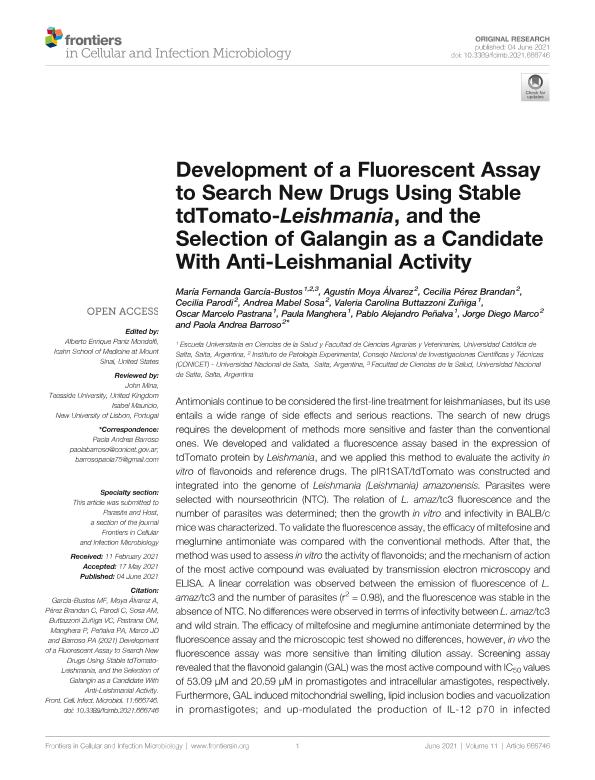Mostrar el registro sencillo del ítem
dc.contributor.author
Garcia Bustos, Maria Fernanda

dc.contributor.author
Moya Alvarez, Agustin

dc.contributor.author
Pérez Brandan, Cecilia María

dc.contributor.author
Parodi Ramoneda, Cecilia María

dc.contributor.author
Sosa, Andrea Mabel

dc.contributor.author
Buttazzoni Zuñiga, Valeria Carolina
dc.contributor.author
Pastrana, Oscar Marcelo

dc.contributor.author
Manghera, Paula Mariana

dc.contributor.author
Peñalva, Pablo Alejandro
dc.contributor.author
Marco, Jorge Diego

dc.contributor.author
Barroso, Paola Andrea

dc.date.available
2022-04-04T11:00:10Z
dc.date.issued
2021-06-04
dc.identifier.citation
Garcia Bustos, Maria Fernanda; Moya Alvarez, Agustin; Pérez Brandan, Cecilia María; Parodi Ramoneda, Cecilia María; Sosa, Andrea Mabel; et al.; Development of a Fluorescent Assay to Search New Drugs Using Stable tdTomato-Leishmania, and the Selection of Galangin as a Candidate With Anti-Leishmanial Activity; Frontiers Media; Frontiers in Cellular and Infection Microbiology; 11; 4-6-2021; 1-13
dc.identifier.issn
2235-2988
dc.identifier.uri
http://hdl.handle.net/11336/154227
dc.description.abstract
Antimonials continue to be considered the first-line treatment for leishmaniases, but its use entails a wide range of side effects and serious reactions. The search of new drugs requires the development of methods more sensitive and faster than the conventional ones. We developed and validated a fluorescence assay based in the expression of tdTomato protein by Leishmania, and we applied this method to evaluate the activity in vitro of flavonoids and reference drugs. The pIR1SAT/tdTomato was constructed and integrated into the genome of Leishmania (Leishmania) amazonensis. Parasites were selected with nourseothricin (NTC). The relation of L. amaz/tc3 fluorescence and the number of parasites was determined; then the growth in vitro and infectivity in BALB/c mice was characterized. To validate the fluorescence assay, the efficacy of miltefosine and meglumine antimoniate was compared with the conventional methods. After that, the method was used to assess in vitro the activity of flavonoids; and the mechanism of action of the most active compound was evaluated by transmission electron microscopy and ELISA. A linear correlation was observed between the emission of fluorescence of L. amaz/tc3 and the number of parasites (r2 = 0.98), and the fluorescence was stable in the absence of NTC. No differences were observed in terms of infectivity between L. amaz/tc3 and wild strain. The efficacy of miltefosine and meglumine antimoniate determined by the fluorescence assay and the microscopic test showed no differences, however, in vivo the fluorescence assay was more sensitive than limiting dilution assay. Screening assay revealed that the flavonoid galangin (GAL) was the most active compound with IC50 values of 53.09 µM and 20.59 µM in promastigotes and intracellular amastigotes, respectively. Furthermore, GAL induced mitochondrial swelling, lipid inclusion bodies and vacuolization in promastigotes; and up-modulated the production of IL-12 p70 in infected macrophages. The fluorescence assay is a useful tool to assess the anti-leishmanial activity of new compounds. However, the assay has some limitations in the macrophage-amastigote model that might be related with an interfere of flavanol aglycones with the fluorescence readout of tdTomato. Finally, GAL is a promising candidate for the development of new treatment against the leishmaniasis
dc.format
application/pdf
dc.language.iso
eng
dc.publisher
Frontiers Media

dc.rights
info:eu-repo/semantics/openAccess
dc.rights.uri
https://creativecommons.org/licenses/by/2.5/ar/
dc.subject
FLUORESCENT
dc.subject
DRUGS
dc.subject
LEISHMANIA
dc.subject
GALANGIN
dc.subject.classification
Parasitología

dc.subject.classification
Ciencias de la Salud

dc.subject.classification
CIENCIAS MÉDICAS Y DE LA SALUD

dc.title
Development of a Fluorescent Assay to Search New Drugs Using Stable tdTomato-Leishmania, and the Selection of Galangin as a Candidate With Anti-Leishmanial Activity
dc.type
info:eu-repo/semantics/article
dc.type
info:ar-repo/semantics/artículo
dc.type
info:eu-repo/semantics/publishedVersion
dc.date.updated
2021-07-01T17:47:07Z
dc.journal.volume
11
dc.journal.pagination
1-13
dc.journal.pais
Estados Unidos

dc.description.fil
Fil: Garcia Bustos, Maria Fernanda. Consejo Nacional de Investigaciones Científicas y Técnicas. Centro Científico Tecnológico Conicet - Salta. Instituto de Patología Experimental. Universidad Nacional de Salta. Facultad de Ciencias de la Salud. Instituto de Patología Experimental; Argentina
dc.description.fil
Fil: Moya Alvarez, Agustin. Consejo Nacional de Investigaciones Científicas y Técnicas. Centro Científico Tecnológico Conicet - Salta. Instituto de Patología Experimental. Universidad Nacional de Salta. Facultad de Ciencias de la Salud. Instituto de Patología Experimental; Argentina
dc.description.fil
Fil: Pérez Brandan, Cecilia María. Consejo Nacional de Investigaciones Científicas y Técnicas. Centro Científico Tecnológico Conicet - Salta. Instituto de Patología Experimental. Universidad Nacional de Salta. Facultad de Ciencias de la Salud. Instituto de Patología Experimental; Argentina
dc.description.fil
Fil: Parodi Ramoneda, Cecilia María. Consejo Nacional de Investigaciones Científicas y Técnicas. Centro Científico Tecnológico Conicet - Salta. Instituto de Patología Experimental. Universidad Nacional de Salta. Facultad de Ciencias de la Salud. Instituto de Patología Experimental; Argentina
dc.description.fil
Fil: Sosa, Andrea Mabel. Consejo Nacional de Investigaciones Científicas y Técnicas. Centro Científico Tecnológico Conicet - Salta. Instituto de Patología Experimental. Universidad Nacional de Salta. Facultad de Ciencias de la Salud. Instituto de Patología Experimental; Argentina
dc.description.fil
Fil: Buttazzoni Zuñiga, Valeria Carolina. Facultad de Ciencias Agrarias y Veterinarias ; Universidad Catolica de Salta;
dc.description.fil
Fil: Pastrana, Oscar Marcelo. Facultad de Ciencias Agrarias y Veterinarias ; Universidad Catolica de Salta;
dc.description.fil
Fil: Manghera, Paula Mariana. Facultad de Ciencias Agrarias y Veterinarias ; Universidad Catolica de Salta;
dc.description.fil
Fil: Peñalva, Pablo Alejandro. Facultad de Ciencias Agrarias y Veterinarias ; Universidad Catolica de Salta;
dc.description.fil
Fil: Marco, Jorge Diego. Consejo Nacional de Investigaciones Científicas y Técnicas. Centro Científico Tecnológico Conicet - Salta. Instituto de Patología Experimental. Universidad Nacional de Salta. Facultad de Ciencias de la Salud. Instituto de Patología Experimental; Argentina
dc.description.fil
Fil: Barroso, Paola Andrea. Consejo Nacional de Investigaciones Científicas y Técnicas. Centro Científico Tecnológico Conicet - Salta. Instituto de Patología Experimental. Universidad Nacional de Salta. Facultad de Ciencias de la Salud. Instituto de Patología Experimental; Argentina
dc.journal.title
Frontiers in Cellular and Infection Microbiology
dc.relation.alternativeid
info:eu-repo/semantics/altIdentifier/url/https://www.frontiersin.org/articles/10.3389/fcimb.2021.666746/full
dc.relation.alternativeid
info:eu-repo/semantics/altIdentifier/doi/http://dx.doi.org/10.3389/fcimb.2021.666746
Archivos asociados
